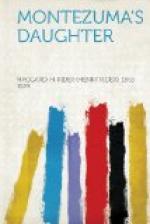In this city I hid with my men, though it was no easy task to persuade them to take up their habitation among so many ghosts of the departed, not to speak of the noisome fevers and the wild beasts and snakes that haunted it, for I had information that the Spaniards would pass through the swamp that lies between the ruins and the river, and there I hoped to ambush them. But on the eighth day of my hiding I learned from spies that Cortes had crossed the great river higher up, and was cutting his way through the forest, for of swamps he had passed more than enough. So I hurried also to the river intending to cross it. But all that day and all that night it rained as it can rain nowhere else in the world that I have seen, till at last we waded on our road knee deep in water, and when we came to the ford of the river it was to find a wide roaring flood, that no man could pass in anything less frail than a Yarmouth herring boat. So there on the bank we must stay in misery, suffering many ills from fever, lack of food, and plenitude of water, till at length the stream ran down.
Three days and nights we waited there, and on the fourth morning I made shift to cross, losing four men by drowning in the passage. Once over, I hid my force in the bush and reeds, and crept forward with six men only, to see if I could discover anything of the whereabouts of the Spaniards. Within an hour I struck the trail that they had cut through the forest, and followed it cautiously. Presently we came to a spot where the forest was thin, and here Cortes had camped, for there was heat left in the ashes of his fires, and among them lay the body of an Indian who had died from sickness. Not fifty yards from this camp stood a huge ceiba, a tree that has a habit of growth not unlike that of our English oak, though it is soft wooded and white barked, and will increase more in bulk in twenty years than any oak may in a hundred. Indeed I never yet saw an oak tree so large as this ceiba of which I write, either in girth or in its spread of top, unless it be the Kirby oak or the tree that is called the ‘King of Scoto’ which grows at Broome, that is the next parish to this of Ditchingham in Norfolk. On this ceiba tree many zaphilotes or vultures were perched, and as we crept towards it I saw what it was they came to seek, for from the lowest branches of the ceiba three corpses swung in the breeze. ‘Here are the Spaniard’s footprints,’ I said. ‘Let us look at them,’ and we passed beneath the shadow of the tree.
As I came, a zaphilote alighted on the head of the body that hung nearest to me, and its weight, or the wafting of the fowl’s wing, caused the dead man to turn round so that he came face to face with me. I looked, started back, then looked again and sank to the earth groaning. For here was he whom I had come to seek and save, my friend, my brother, Guatemoc the last emperor of Anahuac. Here he hung in the dim and desolate forest, dead by the death of a thief, while the vulture shrieked upon his head. I sat bewildered and horror-stricken, and as I sat I remembered the proud sign of Aztec royalty, a bird of prey clasping an adder in its claw. There before me was the last of the stock, and behold! a bird of prey gripped his hair in its talons, a fitting emblem indeed of the fall of Anahuac and the kings of Anahuac.




